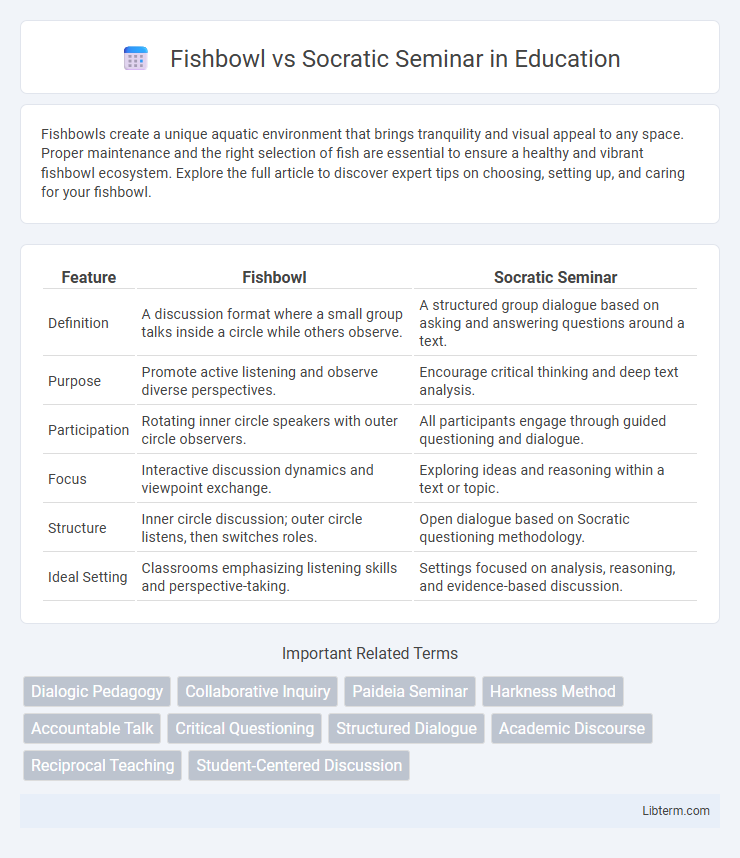Fishbowls create a unique aquatic environment that brings tranquility and visual appeal to any space. Proper maintenance and the right selection of fish are essential to ensure a healthy and vibrant fishbowl ecosystem. Explore the full article to discover expert tips on choosing, setting up, and caring for your fishbowl.
Table of Comparison
| Feature | Fishbowl | Socratic Seminar |
|---|---|---|
| Definition | A discussion format where a small group talks inside a circle while others observe. | A structured group dialogue based on asking and answering questions around a text. |
| Purpose | Promote active listening and observe diverse perspectives. | Encourage critical thinking and deep text analysis. |
| Participation | Rotating inner circle speakers with outer circle observers. | All participants engage through guided questioning and dialogue. |
| Focus | Interactive discussion dynamics and viewpoint exchange. | Exploring ideas and reasoning within a text or topic. |
| Structure | Inner circle discussion; outer circle listens, then switches roles. | Open dialogue based on Socratic questioning methodology. |
| Ideal Setting | Classrooms emphasizing listening skills and perspective-taking. | Settings focused on analysis, reasoning, and evidence-based discussion. |
Understanding Fishbowl Discussions
Fishbowl discussions involve a small group of participants seated in an inner circle actively engaging in dialogue while others observe from an outer circle, promoting focused and transparent communication dynamics. This method fosters deep understanding by allowing observers to analyze the interaction and later contribute their reflections, enhancing collective insight. Unlike Socratic seminars, which emphasize guided questioning and open-ended dialogue among all participants, fishbowls prioritize real-time engagement with cyclical roles between speakers and audience.
What is a Socratic Seminar?
A Socratic Seminar is a student-centered discussion method where participants engage in deep dialogue by asking and answering open-ended questions about a specific text or topic. It emphasizes critical thinking, active listening, and collaborative exploration of ideas without a formal hierarchical structure. Unlike Fishbowl, which features an inner and outer circle of discussion participants, a Socratic Seminar operates with the entire group participating equally to foster reflective and analytical conversations.
Key Differences Between Fishbowl and Socratic Seminar
Fishbowl and Socratic Seminar differ primarily in structure and participant roles: Fishbowl involves an inner circle of speakers actively discussing while an outer circle observes, promoting dynamic interaction and immediate feedback, whereas a Socratic Seminar features all participants engaged in dialogue with an emphasis on asking open-ended questions to deepen understanding. Fishbowl often limits the number of speakers at a time, fostering focused debate, while Socratic Seminars encourage equal participation and collective inquiry without designated observers. The Fishbowl format suits analyzing specific perspectives within a group, and the Socratic Seminar is ideal for exploring complex texts or ideas through collaborative critical thinking.
Benefits of the Fishbowl Method
The Fishbowl Method enhances student engagement by encouraging active listening and participation within a structured dialogue, fostering diverse perspectives in a collaborative learning environment. It creates an inclusive space where all students have the opportunity to contribute while observing peers, promoting critical thinking and verbal communication skills. This interactive setup also helps develop empathy and deeper understanding by allowing participants to see discussions from multiple viewpoints.
Advantages of the Socratic Seminar Approach
The Socratic Seminar approach fosters critical thinking by encouraging open dialogue and deep analysis of complex ideas, promoting active student engagement and collaborative learning. It develops communication skills through structured questioning and attentive listening, allowing participants to explore diverse perspectives and build on each other's insights. This method enhances comprehension and retention by emphasizing evidence-based reasoning and thoughtful reflection, making it an effective tool for cultivating higher-order thinking in educational settings.
Classroom Implementation: Fishbowl vs Socratic
Fishbowl involves a small group of students discussing a topic while the rest of the class observes, promoting active listening and participation in a controlled environment. Socratic Seminar centers on student-led dialogue driven by open-ended questions, fostering critical thinking and deeper understanding through collaborative exploration. Both strategies enhance classroom engagement but differ in structure; Fishbowl emphasizes observation and participation balance, whereas Socratic Seminar prioritizes dialogue and inquiry.
Student Engagement in Fishbowl and Socratic Seminars
Fishbowl discussions promote high student engagement by encouraging active listening and participation through a rotating inner circle of speakers, which keeps all students attentive and involved. Socratic Seminars foster critical thinking and deep dialogue by having students pose and respond to open-ended questions, enabling equal voice and collaborative exploration of complex texts. Both methods enhance student engagement, but Fishbowl emphasizes dynamic interaction and inclusivity, while Socratic Seminars prioritize reflective discourse and analytical reasoning.
Assessment Strategies for Both Methods
Fishbowl and Socratic Seminar assessment strategies emphasize active participation and critical thinking, with Fishbowl allowing evaluators to assess students' communication skills and ability to engage in real-time dialogue within a smaller, rotating group. Socratic Seminar assessments focus on students' evidence-based reasoning, question formulation, and deep textual analysis, often using rubrics to measure the quality of contributions and reflective listening. Both methods rely on qualitative feedback and peer evaluation to measure comprehension, collaboration, and higher-order thinking skills.
Choosing the Right Discussion Method
Choosing the right discussion method depends on group size and learning objectives: Fishbowl facilitates dynamic, visual engagement with a smaller, rotating inner circle, ideal for in-depth analysis and active listening. Socratic Seminar encourages structured, inquiry-based dialogue in larger groups, promoting critical thinking through open-ended questioning and reflective responses. Consider Fishbowl for experiential participation and Socratic Seminar for fostering comprehensive, text-based exploration.
Best Practices and Tips for Success
Fishbowl discussions thrive on active listening and rotating participant roles to maintain engagement and diverse perspectives, while Socratic Seminars emphasize open-ended questioning and critical thinking to deepen understanding. Best practices for Fishbowl include setting clear participation guidelines and using a timer to allow equal speaking opportunities, whereas Socratic Seminars benefit from well-prepared questions and a facilitator who encourages evidence-based dialogue. Success in both formats relies on fostering a respectful environment, promoting thoughtful reflection, and preparing participants with background knowledge and discussion protocols.
Fishbowl Infographic

 libterm.com
libterm.com